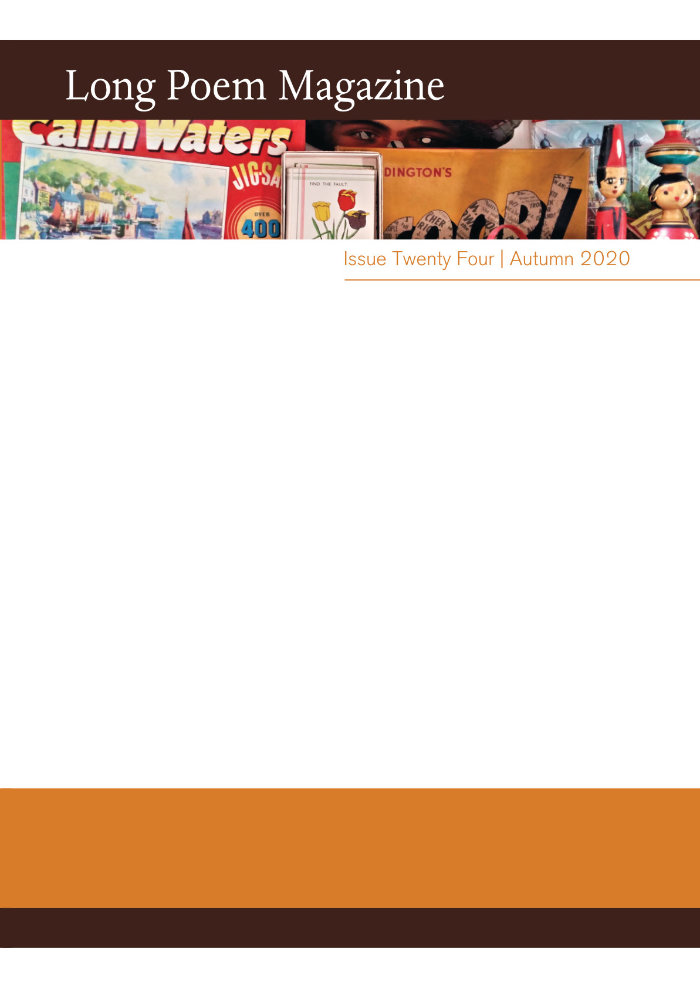A poem doesn’t have to use word-based language: see Christian Morgenstern’s eloquent poem ‘Fishes’ Night Song’*, eight lines of those dashes and tiny semi-circles that are used by linguists but also look like fish scales and waves. But language is the usual and major material of a poem and it becomes magnificent in the spread and sparkle of a long poem. This is particularly noticeable in this issue of Long Poem Magazine. Of course, previous issues have used varied language – translation, invented speech, dialect – and Issue 24 is no exception.
In ‘Ter Death Lay o’ Boudiga, Last Chieftain o’ ter Ickneys’, Naomi Foyle’s dialect-driven lines help the reader appreciate that a great historic figure is different from ourselves:
Hammered spear, her hair. Spawlin’ raw, her ire.
Mine tongue a claggy crome,
I’ll un-rhyme ter lies o’ Rome,
flair ter future wi’ her name.
Foyle’s introduction to her poem adds that Boudiga may have spoken a proto-Welsh/Cornish/Breton form of Gaelic. Using the Norfolk dialect of her family was a way for the poet to connect with her subject. If a reader is from Norfolk, the source of the dialect used by Foyle and taught to her by her aunt, then surely a sense of extra camaraderie will build up as they take in the poem. There’s a glossary appended to this poem because, here at Long Poem Magazine, we are not afraid of glossaries, notes, explanations or references. To enjoy a long poem is to settle down into another world and getting to know the local speech is more than just sightseeing.
Language play does not have to be based in a particular language – it can take on cultural echoes. Javy Awan plays wildly with the (English) language of joy in his wedding celebration, ‘Nuptial Dances’. His lines dance along and every so often he adds a burst of almost-recognisable words that take a reader beyond standard English:
we scoot out into the avenue,
right across the traffic – honking past us like jazzmen
(Phreaw! Wonk-wonk! Phrut-phroo! Breep!)
Our essay explores the work of Gertrude Stein, one early exponent of the unexpected power and reach of everyday language. She is responsible for one of the most quoted lines of poetry: ‘a rose is a rose is a rose.’ There are countless theses on the meaning of that ‘poetic’ line but Susie Campbell, in an essay of great depth on a poem sequence written by Stein in 1914, demonstrates that for a line to build meaning, its language needs techniques to evade time – length in a poem is one of the more simple of such techniques.
Stein’s ‘radical experimentation with literary language and form’, as Campbell describes it, prefigures some of the twentieth century’s most innovative poets. John Gallas, translator of Jean Genet’s ‘Fisherman, Le Suquet’, describes Genet’s poetry: ‘His few poems are all long, dense with word-play, mixed and echoing imagery, neologistic compounds, and a kind of ecstatic current diverted at times into channels both bright and dark and often knotted with slang and sexual vocabulary’:
And the feet of Time are dark.
And nothing will bloom there but strange purple flowers
From crinkled bulbs.
Let us carry our hands to our hearts
And our fists to our teeth
There are many schools of poetic language and, luckily, many translators of brilliant poets into English. We appreciate them all and encourage poets of any non-standard English work to submit to Long Poem Magazine. Readers know we are an eclectic journal and we hope that every issue is a romp through the style and form of poetic language.
Claire Crowther, November 2020*https://www.lieder.net/lieder/get_text.html?TextId=40800
